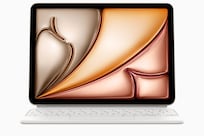BEIJING // The British Prime Minister David Cameronis intent on striking deals worth billions of dollars on his China visit to help the UK economy.
In turn, the Chinese are using his two-day visit to lobby for a lifting of restrictions on the export of British technology to the Middle Kingdom.
Mr Cameron touched down yesterday in the Chinese capital flanked by a delegation of business leaders looking to benefit from the dragon economy's continued growth.
While he raised concerns about China's human rights record during a visit to the country in 2007 when he was the opposition leader, the subject is more muted on this trip.
Instead, the focus is on striking deals in areas such as education and engineering and in trying to persuade the Chinese to loosen restrictions on foreign investments in key industries including banking and telecommunications.
"We want a stronger economic and business relationship with China," Mr Cameron said. "We are the fifth-largest economy in the world but we have only 2 per cent of China's imports. But our dialogue is mature enough that we cover all of these areas, including human rights."
Yesterday, Mr Cameron was photographed outside a supermarket run by Tesco, which plans to invest US$3 billion (Dh11.01bn) in China on new stores. As he posed for the cameras, the Rolls-Royce Group was signing a $1.2bn contract with China Eastern Airlines to supply the carrier with 16 jet engines.
British exports to China, at £7.7bn (Dh45.6bn) annually, are just a fraction of the £25.4bn China exports to the UK. Ahead of his visit, Mr Cameron said he would like bilateral trade to double by 2015 to $100bn, with British exports making up $30bn of this.
More than 40 deals, together worth billions of dollars, are expected to be announced before Mr Cameron leaves China for South Korea today.
Yesterday, he met the Chinese premier Wen Jiabao who said the British government had showed "determination to push forward friendly co-operation between China and the UK", according to Bloomberg. "It's a great pleasure to be back in China and to be back with such a big delegation of ministers and businesspeople," Mr Cameron said.
"I well remember our meeting in 2009 and the promises I made if I won the election and I'm glad we are delivering on those promises."
More than 40 business leaders from industries including petrochemicals, banking and aviation are accompanying Mr Cameron.
The chief executive of Royal Dutch Shell Peter Voser, and Lucy Neville-Rolfe, the Tesco executive director, are among them, along with the British chancellor of the exchequer George Osborne. Yesterday, he and the Chinese vice premier Wang Qishan discussed economic co-operation.
"We hope China and Britain can further pragmatic co-operation, making high-end manufacturing, the green economy, infrastructure and financial services new highlights of our partnership," Mr Wang said.
Later, during a meeting with the delegation, he highlighted the paucity of investment from the UK into China. "To be frank the share of British investment in China is still quite small. Britain is conducting less technology trade with China than Germany, France and even Italy and Sweden. That is not commensurate with the status of our bilateral relationship," he said.
Although reservations about Mr Cameron's lack of emphasis on human rights were raised by some sections of the media in the West, business officials in China have welcomed the visit.
"I think this is very important to showcase the UK's strengths and arouse the interest of Chinese companies and Chinese officials in the UK," said Sophie Bao, a chief representative for the China-Britain Business Council. "China is trying to internationalise itself. It needs expertise and technology."





